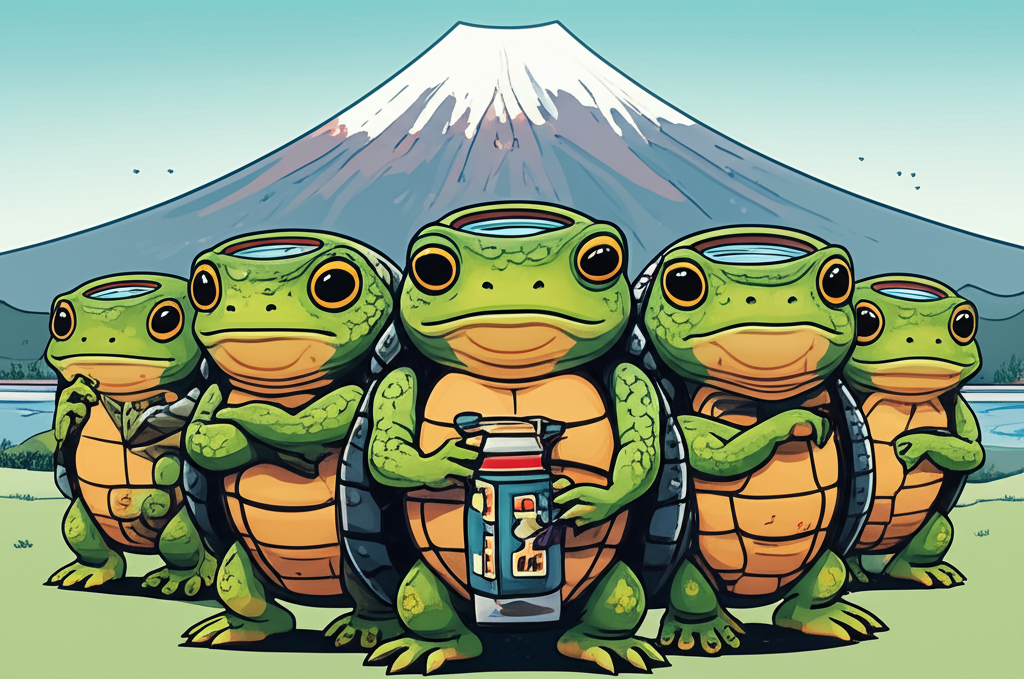
In the heart of Japan, where mist-shrouded peaks pierce the cerulean sky and ancient traditions intertwine with the modern world, stands Mount Fuji. This iconic volcano, a symbol of beauty and serenity, has long been a focal point of reverence and awe. But beneath its majestic facade, woven into the fabric of Japanese folklore, lies a fascinating tapestry of myths and legends. Among these, the tales of the Kappa, often depicted as guardians of the sacred mountain and its life-giving waters, offer a glimpse into the worldview of ancient Japanese people.
This is not a story of divine beings to be worshipped, but rather a traditional narrative passed down through generations, a testament to the rich cultural heritage and the boundless imagination of those who once looked upon Mount Fuji and saw not just rock and snow, but a world alive with spirits and potent forces.
The genesis of the Kappa myth can be traced back to a time when the Japanese people lived in closer proximity to nature, their lives intimately connected to the cycles of the seasons, the fertility of the land, and the unpredictable power of water. This was an era, perhaps feudal Japan or even earlier, where the world was perceived as imbued with animism – the belief that spirits inhabited all things, from towering trees and flowing rivers to the very mountains that dominated their landscape. Natural phenomena were not merely occurrences; they were manifestations of unseen forces, often benevolent, sometimes capricious, and always demanding respect.
Mount Fuji itself, with its imposing presence and volcanic power, was a prime candidate for such spiritual interpretation. Its eruptions, though fearsome, were also seen as expressions of the mountain’s spirit, and its meltwater, flowing down to nourish the surrounding lands, was a gift from this powerful entity. The Kappa, in this context, emerged as an integral part of this natural cosmology.
The Kappa, as described in these ancient tales, is a creature of unique and often contradictory characteristics. Physically, they are typically depicted as humanoid, roughly the size of a child, with green, scaly skin that allows them to blend seamlessly with their aquatic environments. Their most distinctive feature is a shallow, dish-like cavity on the top of their heads, perpetually filled with water. This "dish" is considered the source of their strength and power; if the water spills, their abilities wane, and they become vulnerable. They are often described as having webbed hands and feet, a sharp beak, and a shell on their backs, reminiscent of a turtle.
Symbolically, the Kappa embodies the dual nature of water – its life-giving properties and its potential for destruction. Their aquatic habitat signifies purity and sustenance, while their sometimes mischievous or even malevolent actions reflect the unpredictable and dangerous aspects of rivers and lakes. The water-filled dish on their heads can be interpreted as a metaphor for the balance of nature, a delicate equilibrium that must be maintained. Their association with Mount Fuji further solidifies their role as stewards of this powerful natural entity, connected to the lifeblood that emanates from its slopes.
The narratives surrounding the Kappa are as varied as the streams they inhabit. One common theme depicts them as mischievous pranksters, pulling cows into rivers, tickling sleeping people, or stealing cucumbers – a delicacy they are said to adore. These lighter tales often served as cautionary stories, reminding people to be mindful of their surroundings and to respect the natural world.
However, other tales paint a more serious picture. When angered or provoked, Kappa could become dangerous, even drowning humans or animals. Yet, they were not inherently evil. They were often depicted as possessing a deep understanding of medicine and healing. If a human managed to defeat a Kappa, perhaps by tricking it into spilling the water from its head-dish, the defeated creature might reveal secrets of healing or knowledge of herbs in exchange for its life. This duality, of being both a threat and a potential source of wisdom, is central to their mythological significance.
One imagined narrative might unfold thus: In the shadow of Mount Fuji, where ancient cedars whispered secrets to the wind, lived a village whose prosperity depended on the clear, cool waters that cascaded down the sacred mountain. The villagers held a deep respect for these waters, understanding that they were gifts from the spirit of Fuji. They also spoke in hushed tones of the Kappa, beings who dwelled in the deeper pools and shaded riverbanks.
Old Man Hiroshi, his face a roadmap of wrinkles etched by sun and time, would often tell the younger generation about the Kappa. He spoke of their green skin, slick and shining like moss on river stones, and the curious bowl-like indentation on their heads, always brimming with mountain water. "They are the guardians of the streams," he’d say, his voice raspy, "but their moods are as changeable as the mountain weather."
He recounted a tale of a young fisherman, eager to prove his bravery, who ventured too far up the river, disturbing the tranquil waters where the Kappa were said to reside. The fisherman, boasting of his skill, cast his net with a flourish, catching not fish, but a slippery, scaled arm. A fierce struggle ensued, the water churning as the Kappa fought for its freedom. The fisherman, remembering his grandfather’s words, managed to catch the Kappa off guard, tilting its head and causing the precious water to spill. Weakened and humbled, the Kappa pleaded for its life, revealing the location of a hidden patch of medicinal herbs that would heal the village elder’s persistent cough. The fisherman, his bravado tempered by newfound respect, returned with the herbs, and the village learned a valuable lesson about the delicate balance between man and nature, and the wisdom that could be found even in the most unlikely of encounters.
The symbolism embedded in the Kappa myth is multifaceted. Primarily, it represents the power and unpredictability of nature, particularly water, which is essential for life but can also be a force of destruction. Their role as guardians of Mount Fuji’s waters highlights the ancient Japanese reverence for the mountain and its life-sustaining resources. The Kappa also embody a form of nature’s justice, punishing those who disrespect the environment and rewarding those who show humility and understanding. Their ability to heal, while also posing a threat, suggests a complex relationship with humanity, where knowledge and survival often depend on a precarious balance of power and diplomacy.
In the modern world, the Kappa has transcended its origins as a mere folktale. It has become a beloved figure in Japanese popular culture, appearing in manga, anime, video games, and literature. These modern interpretations often play with the Kappa’s established characteristics, sometimes emphasizing their mischievous side for comedic effect, while other times portraying them as wise, ancient beings offering guidance or posing unique challenges. The Kappa’s image is instantly recognizable, a cultural icon that continues to capture the imagination of both Japanese and international audiences. It serves as a reminder of Japan’s rich folklore and its enduring connection to the natural world.
It is important to reiterate that the stories of the Kappa are traditional narratives, born from the cultural landscape and the worldview of ancient peoples. They are not to be believed as literal truths or divine powers. As Muslims, we recognize that the sole Creator and Sustainer of all that exists is Allah (SWT). These stories, however, offer invaluable insights into the human capacity for storytelling, our deep-seated connection to the natural world, and the ways in which cultures have sought to understand and explain the mysteries surrounding them. The Kappa, in their watery abodes beneath the watchful gaze of Mount Fuji, remain a fascinating testament to the enduring power of imagination and the rich tapestry of human heritage.




